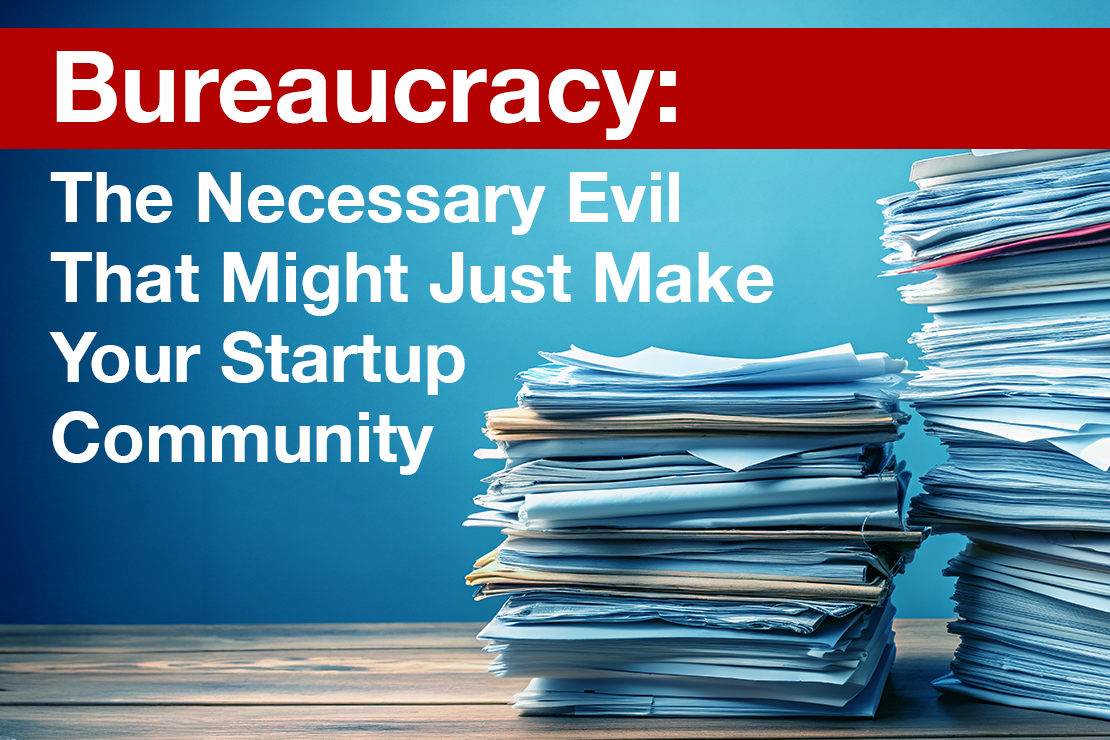Bureaucracy: The Necessary Evil That Might Just Make Your Startup Community
Mar 31, 2025

By Chris Heivly, Managing Director at Build The Fort and Startup Community EIR @ Techstars
Alright, let’s get one thing straight: when you hear the word "bureaucracy," you probably don’t get all warm and fuzzy inside. If you’re like most startup folks, you might even cringe a little. Or a lot. Bureaucracy has a reputation for being slow, rigid, and — let’s be honest — kind of a pain in the ass. But here’s the thing: if you’re building a startup community, bureaucracy isn’t the enemy. In fact, when leveraged correctly, this necessary evil can be a secret weapon to advance entrepreneurship in your region.
I know, I know — sounds crazy. But hear me out.
One of the biggest challenges in startup community building is consistency. Too often, we rely on the enthusiasm of a few passionate people to drive things forward. That’s great — until those people move, burn out, or get busy with their own startups. A strong startup community needs repeatable, structured processes to keep things moving, and this is where bureaucracy actually shines.
Think about it: bureaucracy exists to create order and repeatability. And that’s exactly what we need when we’re trying to make startup support programs sustainable. A few examples of how bureaucracies can help:
Funding – We all need money to make our programs run. Governments, corporations and other large institutions all have money. Yes, they can change their minds every few years but it is still more stable than other sources.
Expertise – Inherent in every bureaucratic organization is a large group of people who have specific expertise that you can lean on to solve specific problems. And they are here to help you solve problems.
Policy – Ever heard an entrepreneur complain about zoning laws, business licenses, or tax issues? Of course, you have. The good news? Bureaucracy has processes for changing those things. Getting involved in policy discussions (instead of just griping about them) can lead to real change.
Bureaucracy aka “the machine” also has something startup communities need: ample resources. Institutions have money and people dedicated to programs that support economic growth. The trick is knowing how to navigate the system to make it work for entrepreneurs.
Startup Connectors – Some cities have startup liaisons whose job is to connect entrepreneurs with resources. If your city has one, use them. If not, advocate for one. Raleigh, NC, saw huge benefits when they hired Derek Minor specifically to build startup relationships.
Co-Working & Innovation Hubs – Many local governments and universities fund or heavily subsidize co-working spaces, which create entrepreneurial density — the lifeblood of any startup scene.
Capital Funding – Arch Grants is a nonprofit organization (funded primarily through private donations, corporate sponsorships, and philanthropic contributions) that provides equity-free grants of $75,000 to startups willing to relocate to St. Louis, Missouri for at least one year. The goal? To attract and support high-growth startups that can boost the region’s entrepreneurial ecosystem.
Look, I get it. Bureaucracy can be slow. It can be frustrating. But it’s also powerful and an integral actor in the complex system of startup community building. Instead of fighting it or worse yet ignoring it, startup community leaders should learn to use it to their advantage. Find the right doors to knock on, the right people to connect with, and the right activities to partner with. The best startup ecosystems don’t ignore bureaucracy — they leverage it.
Want to build something that lasts? Learn how to work the system.
Learn more about Techstars Startup Community™ partnerships, a new way for you to build your thriving startup community as a member of the Techstars network.
About the Author

Chris Heivly
Chris is one of the nation’s leading experts on launching startups and has been dubbed the “Startup Whisperer.” He co-founded MapQuest, is an angel investor, ran a corporate venture fund and 2 micro venture funds (directed over $75M), and was most recently SVP Innovation with Techstars. Chris just released his new book, The Startup Community Builder’s Field Guide for founders, investors and economic development leaders to better accelerate their ecosystem.
